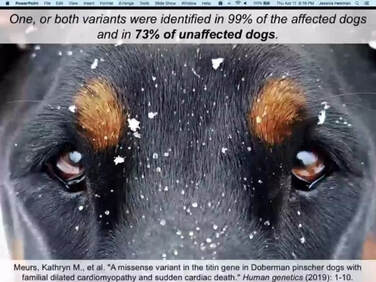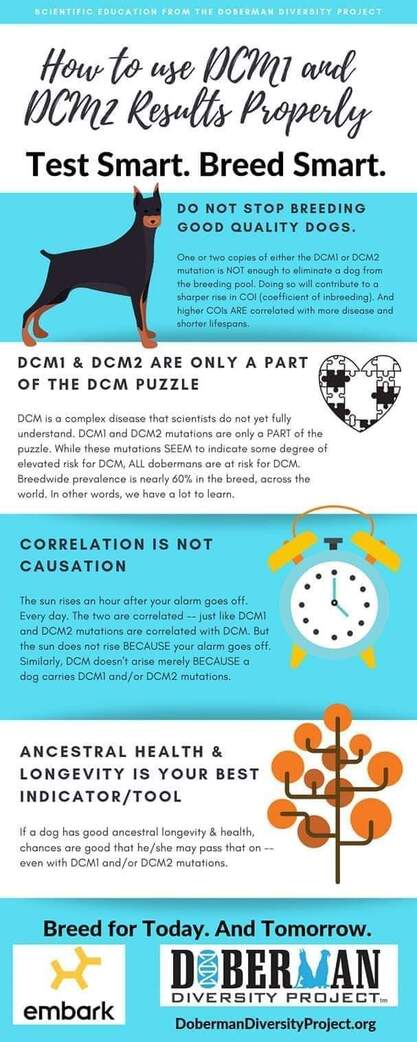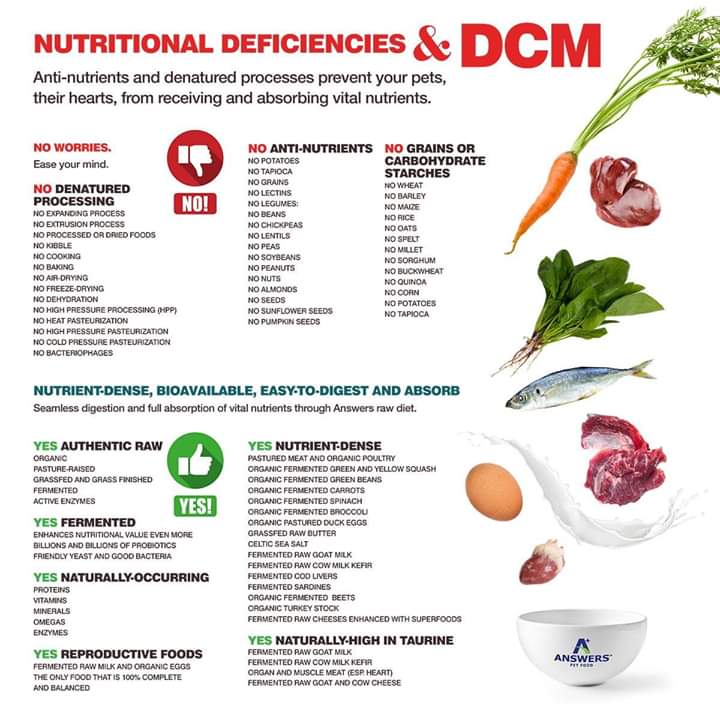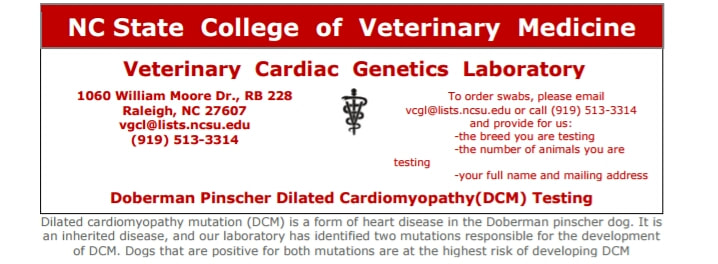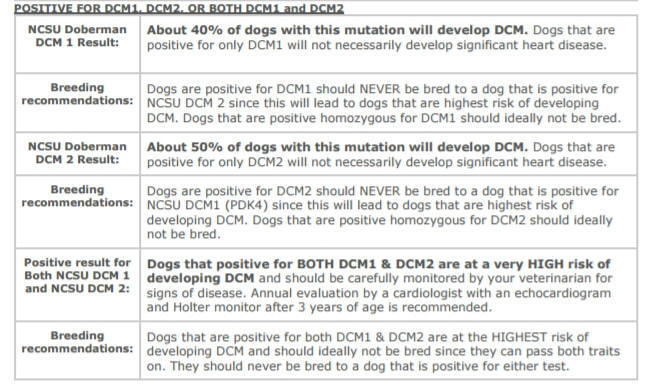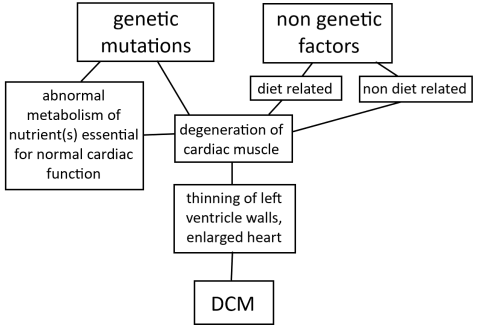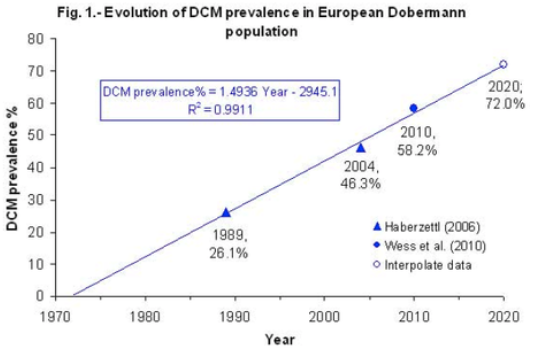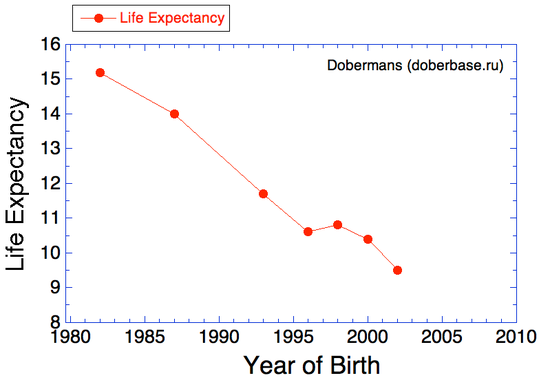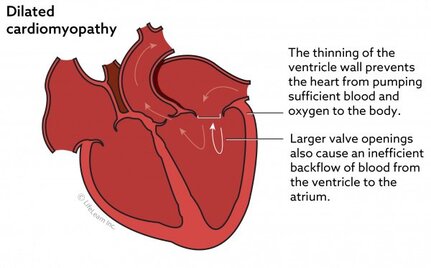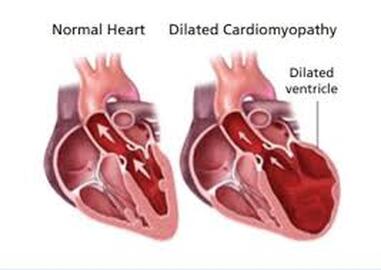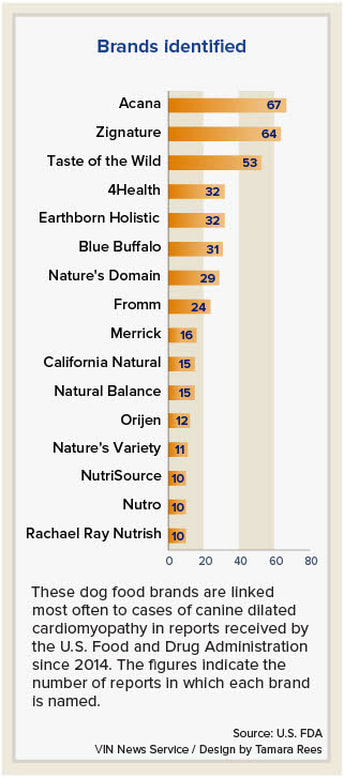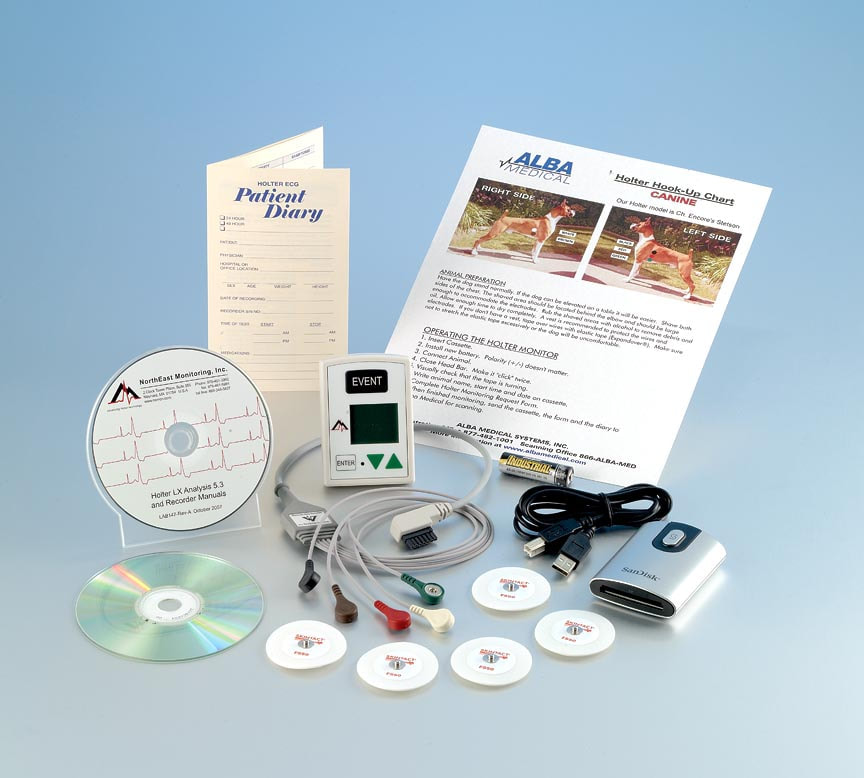With all the good and grace that is the Doberman there is a dark shadow; Dilated Cardiomyopathy, DCM.
DCM is a common form of heart disease among all dogs but particularly plagues the Doberman. Nearly 60% of all Doberman will be diagnosed with DCM by the age of 8 years old. There is no way to prevent DCM. It is a very complex disease. There are many factors to DCM, from environmental, hereditary, genetic, nutritional, eugenics, and more. It is a devastating disease, often fatal, and hard to detect early.
https://onlinelibrary.wiley.com/doi/full/10.1111/j.1939-1676.2010.0479.x
DCM is a common form of heart disease among all dogs but particularly plagues the Doberman. Nearly 60% of all Doberman will be diagnosed with DCM by the age of 8 years old. There is no way to prevent DCM. It is a very complex disease. There are many factors to DCM, from environmental, hereditary, genetic, nutritional, eugenics, and more. It is a devastating disease, often fatal, and hard to detect early.
https://onlinelibrary.wiley.com/doi/full/10.1111/j.1939-1676.2010.0479.x
The Rise of DCM
Before the 1970's DCM was barely heard of. Since the rise of the Doberman's popularity in the AKC show ring and in the hearts of people globally DCM has been on the rise. One theory, the "Popular Sire Syndrome", believes one or a few select dogs corrupted the once diverse gene pool and sacrificed the breeds health. The thought is one or a few very popular and in demand dogs dominated pedigrees eliminating much of the diversity that was once there. Another theory is inbreeding reduced the diversity. It is thought by selecting only certain traits or from certain popular kennel lines the breed foundation was sacrificed thus causing the decline of health and diversity. Many other theories exist but one thing is certain, the obvious lack of genetic diversity is the reason the Doberman suffers DCM like it does today.
Prevalence of DCM in Doberman Study: https://pubmed.ncbi.nlm.nih.gov/20202106/
Prevalence of DCM in Doberman Study: https://pubmed.ncbi.nlm.nih.gov/20202106/
Doberman and Genetics
DCM was thought to have a genetic basis but the research is showing genetic mutations alone aren't the cause. The two most common genes researched are DCM1 (aka PDK4) and DCM2. The Doberman Diversity Project states 73% of unaffected Doberman tested in their research had one or both DCM genes and 99% of dogs diagnosed with DCM had one or both genes. Putting it in other words; 7/10 Doberman without clinical DCM carry a DCM gene. 99/100 Doberman who were clinically diagnosed with DCM had at least one DCM gene. Genes alone don't predict DCM. There have been many Doberman to develop DCM and not have the genes, as well as many to have a gene or both and not develop DCM. There is no proven known way to prevent DCM. It is a very complex disease with many factors from environmental, hereditary, genetic, nutritional, to eugenics, and even more. It is a devastating disease and so widespread in the breed there may not be a way to reverse it without drastic measures. "It is estimated that 50% of dogs with one or two copies of DCM2 develop the condition. However, Dobermanns with both DCM1 (one or two copies) and DCM2 (one or two copies) are considered at highest risk, with an estimated 60% likely to develop DCM."
https://mydogdna.com/pages/dilated-cardiomyopathy-in-dobermans
https://mydogdna.com/pages/dilated-cardiomyopathy-in-dobermans
European Dobermans are just as prone to DCM as other lines. European males tend to be slightly more prone to DCM than females, but the difference is marginal. The genes DCM3 and DCM4 seem to have significant effects on the genetic disposition for DCM in the western European population.
"DCM3 is linked to lower overall risk, but it follows a dominant inheritance pattern, which means that the risk of developing the disease is increased if the dog has one or two copies of the risk variant; whereas DCM4, on the other hand, is linked to a higher risk of developing DCM, but it follows a recessive inheritance pattern, and therefore the risk is high only in dogs carrying two copies of the risk variant DCM4 in the absence of DCM3." - this means that DCM3 is dominant and only needs one gene to increase the predisposition to disease risk, while DCM4 is recessive and needs 2 gene mutations to increase the predisposition to disease risk.
https://www.laboklin.co.uk/laboklin/showGeneticTest.jsp?testID=8872
Published in September 2023 the Dobermann DCM study represents the culmination of 20 years of scientific research on Dobermanns they found two genes of high significance on chromosome 5.
https://mydogdna.com/blogs/news/dobermann-dcm-testing
"DCM3 is linked to lower overall risk, but it follows a dominant inheritance pattern, which means that the risk of developing the disease is increased if the dog has one or two copies of the risk variant; whereas DCM4, on the other hand, is linked to a higher risk of developing DCM, but it follows a recessive inheritance pattern, and therefore the risk is high only in dogs carrying two copies of the risk variant DCM4 in the absence of DCM3." - this means that DCM3 is dominant and only needs one gene to increase the predisposition to disease risk, while DCM4 is recessive and needs 2 gene mutations to increase the predisposition to disease risk.
https://www.laboklin.co.uk/laboklin/showGeneticTest.jsp?testID=8872
Published in September 2023 the Dobermann DCM study represents the culmination of 20 years of scientific research on Dobermanns they found two genes of high significance on chromosome 5.
https://mydogdna.com/blogs/news/dobermann-dcm-testing
CFA5 aka DCM5 has a significant influence on the rate of DCM in European Dobermans.
https://www.researchgate.net/publication/51177517_A_Locus_on_Chromosome_5_Is_Associated_with_Dilated_Cardiomyopathy_in_Doberman_Pinschers
https://www.researchgate.net/publication/51177517_A_Locus_on_Chromosome_5_Is_Associated_with_Dilated_Cardiomyopathy_in_Doberman_Pinschers
|
|
| ||||||||||||||||||
DCM Myths
|
Doberman Diversity Crisis, Diet, and DCM as an Autoimmune Disease
|
DCM isn't just genetic related, there is a diet component too. There is a strong link between DCM and diet in several breeds. Vets noticed a sharp increase in DCM cases in breeds not typically prone to DCM. Many pet owners went to the FDA and complained about thier pet's health, which promptly the FDA to look into the matter. While research into the exact cause is still in process one thing is certain; fad diets are bad for our dogs. Fad diets include grain-free, exotic meats, meat only diets, BARF, raw diets and vegan (please, don't feed your omnivorous pet a plant only diet; it will kill him). Avoid trending diets and cures (such as tea tree oil, coconut oil, garlic - which is TOXIC to dogs, and so on). The evidence is solid; fad diets are hurting our pets. But what else may be? Many external factor have an effect on the disease. DCM is complex and hard to predict.
Doberman are one of the most inbred of all the dog world. All Doberman share the same 10 halotypes. That means they are all so closely related to one another it is as if breeding family members together! The average inbreeding ratio is 36%! There is not much diversity left to support healthy dogs and sustain a stable population for long. Lack of diversity gives rise to genetic mutations being passed down more frequently (homozygosity). The smaller gene pool the more the traits are shared.
|
https://plearl.wordpress.com/2019/05/08/pdk4-and-canine-dcm/
Doberman Genetic Crisis - https://www.instituteofcaninebiology.org/blog/an-update-on-the-genetic-status-of-the-doberman-pinscher
https://www.instituteofcaninebiology.org/blog/are-we-watching-the-extinction-of-a-breed-or-why-are-we-focused-on-consequence-instead-of-cause
Doberman Longevivity Study - https://www.veterinarypracticenews.com/uf-announces-lifetime-study-on-fatal-heart-disease-in-doberman-pinschers/
Doberman Diversity Project (open to select populations) - https://www.dobermandiversityproject.org/
Grain Free Diet/Nutritional DCM - https://news.vin.com/vinnews.aspx?articleId=52712
https://www.vin.com/apputil/content/defaultadv1.aspx?meta=&pId=11149&id=3846592
Rates of DCM - https://www.ufaw.org.uk/dogs/doberman-pinscher-dilated-cardiomyopathy
Predictors of DCM - https://www.ncbi.nlm.nih.gov/pmc/articles/PMC4913570/
DCM Related Autoantibodies - https://journals.plos.org/plosone/article?id=10.1371/journal.pone.0214263
Doberman Genetic Crisis - https://www.instituteofcaninebiology.org/blog/an-update-on-the-genetic-status-of-the-doberman-pinscher
https://www.instituteofcaninebiology.org/blog/are-we-watching-the-extinction-of-a-breed-or-why-are-we-focused-on-consequence-instead-of-cause
Doberman Longevivity Study - https://www.veterinarypracticenews.com/uf-announces-lifetime-study-on-fatal-heart-disease-in-doberman-pinschers/
Doberman Diversity Project (open to select populations) - https://www.dobermandiversityproject.org/
Grain Free Diet/Nutritional DCM - https://news.vin.com/vinnews.aspx?articleId=52712
https://www.vin.com/apputil/content/defaultadv1.aspx?meta=&pId=11149&id=3846592
Rates of DCM - https://www.ufaw.org.uk/dogs/doberman-pinscher-dilated-cardiomyopathy
Predictors of DCM - https://www.ncbi.nlm.nih.gov/pmc/articles/PMC4913570/
DCM Related Autoantibodies - https://journals.plos.org/plosone/article?id=10.1371/journal.pone.0214263
The Complexity of DCM Etiologies
DCM is a multifaceted disease with complex etiology. DCM may also be polygenetic and non-hereditary. Disorders such as thyroid disease, endocrine disease, autoimmune dysfunction can cause DCM. "A diverse array of causes for DCM have been identified for both humans and canines including genetic mutations [1,20], infection and autoimmunity [21,22,23,24], toxin exposure like alcohol and cytostatics [25,26], metabolic dysfunction and nutritional deficiencies [26,27,28], and even pregnancy [24,29]. Nevertheless, idiopathic and familial DCM are among the most frequently reported causes [12]." - https://www.ncbi.nlm.nih.gov/pmc/articles/PMC9265105/ Gene penetrance effects how affected by the disease the dog is. In human studies familial inheritance has shown to be an autosomal dominant pattern. There is emerging evidence that epigenetics has a strong role in the development of clinical DCM. "Despite of the progress, the genetic basis of a significant portion of the DCM patients remains unknown. Heterogeneity of disease phenotypes caused by mutations in the same gene raise points to complexity of factors involved in determining the clinical phenotype. There is an emerging recognition that phenotypic traits are not only determined by genetic variants of coding sequences at DNA level but also contributed by the functional state of the genome, which mainly dictates how genes are expressed. Consequently, the epigenetic studies mostly focus on the regulatory mechanisms and the functional consequences of the changes in gene expression rather than the changes in gene sequences. Recent advancement has revealed a growing importance of epigenetic regulation and dysfunction in human physiology and diseases" - https://www.ncbi.nlm.nih.gov/pmc/articles/PMC6581652/ Dobermans from around the world develop DCM, including European Dobermans (https://www.sciencedirect.com/science/article/abs/pii/S0195561610000343?via%3Dihub). "Typically, DCM in dogs is more prevalent in males than in females (Oyama, 2015). More specifically, Doberman Pinschers have a reported incidence rate of 50% in males and 33% in females (Oyama, 2015)..." There may not be a singular answer as to why a dog developed DCM. "If one considers the estimated total number of dogs in the United States equals 77,000,000 (AVMA, 2019), the published incidence studies (Fioretti and Delli, 1988; Sisson et al., 2000) suggest that a minimum of 308,000 to 1,001,000 dogs in the United States have DCM at any given time." - https://academic.oup.com/jas/article/98/6/skaa155/5857674 DCM is the second most common cardiac disorder in canines.
"Historically, DCM has been primarily linked to a genetic predisposition in certain breeds, but emerging science appears to indicate that non-hereditary forms of DCM occur in dogs as a complex medical condition that may be affected by the interplay of multiple factors such as genetics, underlying medical conditions, and diet. Aspects of diet that may interact with genetics and underlying medical conditions may include nutritional makeup of the ingredients and how dogs digest them, ingredient sourcing, processing, formulation, and/or feeding practices. Reports from veterinary cardiologists demonstrate some good results in improving heart function in non-hereditary DCM cases, unlike genetic forms of DCM, with appropriate veterinary treatment and dietary modification, when caught early in the progression of the disease." - https://www.fda.gov/animal-veterinary/animal-health-literacy/questions-answers-fdas-work-potential-causes-non-hereditary-dcm-dogs#:~:text=Historically%2C%20DCM%20has%20been%20primarily,genetics%2C%20underlying%20medical%20conditions%2C%20and
Inbreeding is a real and serious consideration for the development of DCM. In the 90's DCM already affected about 25% of the breed. Each year since the occurrence rate increases 1.5%. (https://www.instituteofcaninebiology.org/blog/an-update-on-the-genetic-status-of-the-doberman-pinscher) The average coefficient of inbreeding in Dobermans is 36%, according to Embark Vet. Inbreeding is associated with decreased life expectancy and poorer health.
"Historically, DCM has been primarily linked to a genetic predisposition in certain breeds, but emerging science appears to indicate that non-hereditary forms of DCM occur in dogs as a complex medical condition that may be affected by the interplay of multiple factors such as genetics, underlying medical conditions, and diet. Aspects of diet that may interact with genetics and underlying medical conditions may include nutritional makeup of the ingredients and how dogs digest them, ingredient sourcing, processing, formulation, and/or feeding practices. Reports from veterinary cardiologists demonstrate some good results in improving heart function in non-hereditary DCM cases, unlike genetic forms of DCM, with appropriate veterinary treatment and dietary modification, when caught early in the progression of the disease." - https://www.fda.gov/animal-veterinary/animal-health-literacy/questions-answers-fdas-work-potential-causes-non-hereditary-dcm-dogs#:~:text=Historically%2C%20DCM%20has%20been%20primarily,genetics%2C%20underlying%20medical%20conditions%2C%20and
Inbreeding is a real and serious consideration for the development of DCM. In the 90's DCM already affected about 25% of the breed. Each year since the occurrence rate increases 1.5%. (https://www.instituteofcaninebiology.org/blog/an-update-on-the-genetic-status-of-the-doberman-pinscher) The average coefficient of inbreeding in Dobermans is 36%, according to Embark Vet. Inbreeding is associated with decreased life expectancy and poorer health.
Why What was Recommended isn't Working
"Clearly, the efforts made by breeders over the last three decades to decrease the incidence DCM have had no effect at all on the prevalence of the disorder. Not even a little." - Carol Beuchat PhD
The above chart on the left shows a striking and steady increase in DCM in the Doberman breed. The chart above on the right shows a sharp decline in the breeds life expectancy. Efforts to reduce DCM have been ineffective. Efforts such as the Holter Project failed to reduce DCM rates by avoiding DCM families and DCM positive dogs. There is clear evidence that DCM is on the rise and longevity is in decline.
Echos, auscultations and holter monitoring are excellent diagnostic tools but have limitations. They are only a SNAPSHOT into the cardiac function at that time and for that duration. They are not a guarantee against developing the disease.
"Recommended Testing Protocol for Cardiac Disease. Annual echocardiograms (an ultrasound of the heart), together with 24 hour Holter Monitoring, provides a snapshot of a dog's current heart health at that moment in time. Your vet can also perform a simple blood test that measures the concentration of NTproBNP in your dog's blood and is a good indicator of heart health. It is important to understand that test results can be normal one year and a dog can show signs of DCM the very next year. This is why breeders must perform ANNUAL heart screening. Two DNA genetic tests are available; they identify two mutations (PDK4) and DCM2) that are thought to be associated with DCM. The tests involves a simple cheek swab and don't necessitate a veterinary visit."
https://www.dobermandiversityproject.org/diseases.html
"Recommended Testing Protocol for Cardiac Disease. Annual echocardiograms (an ultrasound of the heart), together with 24 hour Holter Monitoring, provides a snapshot of a dog's current heart health at that moment in time. Your vet can also perform a simple blood test that measures the concentration of NTproBNP in your dog's blood and is a good indicator of heart health. It is important to understand that test results can be normal one year and a dog can show signs of DCM the very next year. This is why breeders must perform ANNUAL heart screening. Two DNA genetic tests are available; they identify two mutations (PDK4) and DCM2) that are thought to be associated with DCM. The tests involves a simple cheek swab and don't necessitate a veterinary visit."
https://www.dobermandiversityproject.org/diseases.html
DCM Genes are IMPORTANT but NOT Diagnostic
There are currently FOUR DCM genes available for genetic testing. DCM1 aka PDK4, DCM2 aka TTN, DCM3 and DCM4. It is thought about 50% of Dobermans carry DCM1, DCM2 or both. Dogs with DCM1 (hetero or homozygous) are 10 times more like to develop DCM than dogs without a DCM gene. 37% of dogs with the DCM1 gene will develop DCM. Dogs with the DCM2 gene are 21 times more likely to develop DCM than dogs without DCM genes. 50% of dogs carrying the DCM2 gene will develop DCM. DCM3 is linked to the overall LOWEST risk of disease onset, DCM4 is recessive and has the HIGHEST risk of disease onset. Dogs with multiple genes are at the highest risk of DCM.
|
"Important note about the TTN mutation (also known as DCM2): The vast majority of research exploring the genetics of DCM has been performed on purebred American Dobermans, a high risk population for DCM. Even in the Doberman, DCM2 is incompletely penetrant, meaning that while having one or two copies of this mutation is thought to confer some increased risk of developing DCM, it is by no means predictive of disease. DCM is a highly complex disease that is modulated by many genetic factors, most unknown. In addition, Embark and others have identified this mutation in multiple breeds, including breeds where DCM is not a common disease. The impact of this mutation in these breeds is unknown: Embark hopes to change this." - Embark on TTN/DCM2
DCM varies in males and females. Males tend to have echocardiogram changes earlier in age than females, while females tend to show VPCs as sole abnormality even into older age.
https://genomemedicine.biomedcentral.com/articles/10.1186/s13073-023-01221-3 Another tidbit to note; PDK4 (aka DCM1) and TTN (DCM2) are not associated with DCM in the European population. It is important to know the pedigree; if there are any non-Euro dogs in the pedigree PDK4 may be associated with DCM in your dog! There are other DCM variants, DCM3 and DCM4, that do have significance in risk of disease development. - PDK4 risk in Euros https://www.google.com/search?q=pdk4+doberman+european&oq=PDK4&aqs=chrome.1.69i57j69i59j69i61.7369j0j9&sourceid=chrome&ie=UTF-8
DCM1 & DCM2 risk in Euros - https://pubmed.ncbi.nlm.nih.gov/22834541/ 58% of European Dobermans develop DCM by age 8 ( Wess et al (2010a)). - https://www.ufaw.org.uk/dogs/doberman-pinscher-dilated-cardiomyopathy (a note on this article; elimination of all carriers even affected dogs would eliminate of 70% of Doberman. This is not realistic nor sustainable for the breeds future. There is not enough evidence supporting a drastic elimination of the genes as gene free dogs still develop DCM.) Population diversity is crucial to reducing DCM and saving the breed.
| |||||||||||||||||||||||||
PDK4 was associated with autoimmune-like cardiac disease DCM in American Doberman, information on dogs was provided by the DCPA. "The results from our PDK4 gene replacement studies showed improved cellular viability and reduced mitochondrial toxicity, ROS generation, and caspase-9 activation in response to starvation in AAV-PDK4-treated fibroblasts that were deficient for PDK4. In addition to confirming the cause-effect relationship between deficient PDK4 function and mitochondrial-mediated apoptosis, these data also provide strong support for the translation of this gene therapy approach into PDK4del/del DPs in the clinic. ... In sum, we have demonstrated the importance of PDK4 function during periods of low nutrient availability. Our observed activation of the intrinsic apoptotic pathway in fibroblasts deficient for PDK4 suggests that cardiomyocytes in the hearts of PDK4wt/del and PDK4del/del DPs face a similar metabolic challenge. While these dogs rarely experience true nutrient deprivation, the inability to effectively switch from glycolysis to oxidative phosphorylation likely has minor initial consequences that evolve over time into cardiac remodeling and ultimately result in DCM and heart failure. Further investigations into the specific diets of affected and unaffected DPs with identical mutation statuses may reveal a relationship between the development of DCM and nutrition in this at-risk population." - https://www.liebertpub.com/doi/full/10.1089/biores.2017.0023
There is a possible link to nutrition and the PDK4 gene mutations. A proper, balanced diet is important in maintaining optimal cardiac health. It is best to follow proven diets, such as those routinely screened by canine nutritionists and to avoid fad diets (such as raw/BARF/BARD and homemade feeds). "Mitochondrial function was altered in skin fibroblasts of Doberman Pinschers with DCM and PDK4 mutation." Gene therapy was insignificant in treatment of the dogs affected with DCM and PDK4 mutation.
- https://pubmed.ncbi.nlm.nih.gov/27027709/, additional articles: https://avmajournals.avma.org/doi/10.2460/ajvr.77.2.156,
https://www.ncbi.nlm.nih.gov/pmc/articles/PMC5745584/
- https://pubmed.ncbi.nlm.nih.gov/27027709/, additional articles: https://avmajournals.avma.org/doi/10.2460/ajvr.77.2.156,
https://www.ncbi.nlm.nih.gov/pmc/articles/PMC5745584/
A study of the German Doberman populations found "significant genome-wide associations" on the CFA 5 (A lotus) to clinical DCM. "The association could be confirmed in an independent cohort of Doberman Pinschers from the UK. ... In conclusion, we have mapped a major genetic risk factor for DCM in the Doberman Pinscher to CFA 5. In the region of the association signal, no obvious DCM candidate genes are located. Thus the further investigation of this association signal has a high chance of identifying a new DCM gene that might also be of relevance for a fraction of the unexplained human DCM cases." - https://journals.plos.org/plosone/article?id=10.1371/journal.pone.0020042
The science behind DCM genetics is solid and proven. It is real, tangible and reliable. There is validity to the genes significance in indirect disease predisposition. Though the genes are a small portion of DCM risk they are still very important! Any piece of the puzzle is a crucial one. It is important to note that, while the DCM genes play a role in the indirect predisposition to the disease, they are not diagnostic nor preventative. In December 2011 the Doberman tested through Vetnostic as clear/two normal DCM1 (PDK4) genes 15% had early clinical symptoms of DCM. DCM is complex and has many factors. The genes are an important step in mapping out the cause of DCM but shouldn't be used as definitive testing.
A note on Cardiac Regenerative Therapies aka Gene Therapy: Gene therapy is a promising treatment option and could change the way DCM is managed. It's been shown to restore cardiac function and improve quality of life. "Gene transfer strategies to reduce calcium cycling abnormalities improve heart function in animal models as well as in human clinical trials. In this study, Dr. Sleeper will conduct a placebo-controlled, double blinded study to evaluate gene delivery approaches for treatment of Doberman Pinschers affected with DCM and CHF. If results show that the gene delivery slows progression of heart failure in Dobermans with DCM, the results will have significant ramifications for all dogs with heart disease, as calcium handling proteins are abnormally expressed in dogs with heart disease of varying causes." - https://www.akcchf.org/research/research-portfolio/1760.html Dr. Meg Sleeper is the Cardiologist performing this study. https://research.vetmed.ufl.edu/clinical-trials/small-animal/dcm-in-dobermans/
"We have successfully used gene therapy with AAV2tm-cPDK4 to transfect skin fibroblasts of Dobermans carrying the genetic mutation to assess changes in the OCR. Preliminary results of this experiment have shown a trending in increase in OCR." - Cardiac_Regenerative_Therapy_for_Dilated_Cardiomyopathy_in_Doberman_Pinchers_with_PDK4_gene_mutation
The science behind DCM genetics is solid and proven. It is real, tangible and reliable. There is validity to the genes significance in indirect disease predisposition. Though the genes are a small portion of DCM risk they are still very important! Any piece of the puzzle is a crucial one. It is important to note that, while the DCM genes play a role in the indirect predisposition to the disease, they are not diagnostic nor preventative. In December 2011 the Doberman tested through Vetnostic as clear/two normal DCM1 (PDK4) genes 15% had early clinical symptoms of DCM. DCM is complex and has many factors. The genes are an important step in mapping out the cause of DCM but shouldn't be used as definitive testing.
A note on Cardiac Regenerative Therapies aka Gene Therapy: Gene therapy is a promising treatment option and could change the way DCM is managed. It's been shown to restore cardiac function and improve quality of life. "Gene transfer strategies to reduce calcium cycling abnormalities improve heart function in animal models as well as in human clinical trials. In this study, Dr. Sleeper will conduct a placebo-controlled, double blinded study to evaluate gene delivery approaches for treatment of Doberman Pinschers affected with DCM and CHF. If results show that the gene delivery slows progression of heart failure in Dobermans with DCM, the results will have significant ramifications for all dogs with heart disease, as calcium handling proteins are abnormally expressed in dogs with heart disease of varying causes." - https://www.akcchf.org/research/research-portfolio/1760.html Dr. Meg Sleeper is the Cardiologist performing this study. https://research.vetmed.ufl.edu/clinical-trials/small-animal/dcm-in-dobermans/
"We have successfully used gene therapy with AAV2tm-cPDK4 to transfect skin fibroblasts of Dobermans carrying the genetic mutation to assess changes in the OCR. Preliminary results of this experiment have shown a trending in increase in OCR." - Cardiac_Regenerative_Therapy_for_Dilated_Cardiomyopathy_in_Doberman_Pinchers_with_PDK4_gene_mutation
| dcm_gene_therapy_-_keystonesymposiumluizbolferfinal.pdf | |
| File Size: | 4112 kb |
| File Type: | |
Sudden Death/Sudden Cardiac Death (SCD)
Nearly 30% of Doberman will suffer sudden cardiac death (SCD). Many Dobermans will be mid activity and suddenly fall over and pass away. This can be extremely traumatic for their owners. CPR can revive these dogs giving time to get them emergency care. Sudden cardiac death is thought to be associated with DCM. Many of these dogs have no symptoms and even postmortem results find no changes in the heart that is classic of DCM. It's believed these dogs develop arrythmia without heart structure changes. The "blessing in disguise" is these dogs don't suffer very long and pass quickly. Risk factors for SCD is poorly understood. Dogs with DCM are almost always guaranteed to pass away from SCD. There is no prevention for SCD.
Methods to Reduce DCM Occurrence
- Elimination Method - Stop breeding dogs with multiple DCM genes or who have positive echos/holter tests.
- Avoidance Method - Avoid lines and familial groups who develop or are related to a dog that develops DCM.
- Selective Breeding - Breed only certain dogs who meet a strict genetic and physical standard.
- Outcross Genepools - Staying within the breed, bring in unrelated lines and breed together
- Outcross Other Breeds - Select one or multiple breeds to crossbreed into the Doberman and selectively breed the desirable dogs back to purebred Doberman, continuing to breed back to more purebred Doberman.
- Low COI Method - Selectively breed dogs with testes low COI (Coefficient of Inbreeding) to produce low COI litters
Outcrossing? Is it a Viable Option?
I am not shy about supporting outcrossing. I believe outcrossing done right, to breeds not prone to the same cardiac, eye, and cancers that plague Doberman, would benefit the breed. Outcrossing is the only way to introduce new alleles into a closed stud book breed. One risk of outcrossing with other breeds is it could potentially lose what the Doberman is or lose the introduced genetic material. I believe crossing back to the breeds that helped establish the Doberman will help reduce any lost traits (if any), making it easier to cross back into the Doberman we all know and cherish.
Much like the LUA program that outcrossed to correct and reduce the rate of painful and often fatal bladder stones in the Dalmatian, an outcross program may help save the Doberman breed and allow for fresh, untapped lines to be worked into the diversity pool. Diversity can't be added without actually adding to the gene pool. You can't just create new diversity from the diversity we have now.
Let's speculate an outcross program is started and approved by the DPCA. How should it be done? I personally feel we should avoid breeds with VWD, PRA, and cardiac issues. Selecting the best dogs genetically as well as health-wise is crucial. Second, you would breed to look at the dog physically, matching with breeds similar in build to the Doberman. Thirdly, you want to consider the temperament and working ability. You don't just want a dog to look like a Doberman, you want it to be a Doberman. Once you have established a solid base of dogs to cross between, you then start the tedious process of selecting which dogs fit the Doberman standard and your health/program aim and keep them back. You continue to selectively breed until you have worked back up to purebred Doberman (genetically testing as 98% and higher). Temperament testing and working ability can be assessed by professional trainers.
I firmly believe the key to saving the Doberman and preserving the breed is to create more diversity. How that is to be best done is the million dollar question!
"As far as we are aware, there are currently no formal breeding schemes operating which aim to reduce or eliminate this common condition from the Doberman pinscher breed. A genetic test would be very valuable as this would enable the detection and removal of affected individuals from the breeding pool. However, because the condition is so common in Dobermans, there is concern that removal of all affected individuals from the breeding pool might cause excessive restriction in the choice of Dobermans to breed from, and hence a reduction in the size of the breed’s gene pool with the risk that other genetic defects may inadvertently increase in frequency. Such problems could be avoided by out-breeding with dogs of other breeds." - https://www.ufaw.org.uk/dogs/doberman-pinscher-dilated-cardiomyopathy
"As a result of 200 years of inbreeding and selection for specific phenotypic characteristics, the dog has become a magnifying glass for genetic disorders." (https://genomemedicine.biomedcentral.com/articles/10.1186/s13073-023-01221-3)
Much like the LUA program that outcrossed to correct and reduce the rate of painful and often fatal bladder stones in the Dalmatian, an outcross program may help save the Doberman breed and allow for fresh, untapped lines to be worked into the diversity pool. Diversity can't be added without actually adding to the gene pool. You can't just create new diversity from the diversity we have now.
Let's speculate an outcross program is started and approved by the DPCA. How should it be done? I personally feel we should avoid breeds with VWD, PRA, and cardiac issues. Selecting the best dogs genetically as well as health-wise is crucial. Second, you would breed to look at the dog physically, matching with breeds similar in build to the Doberman. Thirdly, you want to consider the temperament and working ability. You don't just want a dog to look like a Doberman, you want it to be a Doberman. Once you have established a solid base of dogs to cross between, you then start the tedious process of selecting which dogs fit the Doberman standard and your health/program aim and keep them back. You continue to selectively breed until you have worked back up to purebred Doberman (genetically testing as 98% and higher). Temperament testing and working ability can be assessed by professional trainers.
I firmly believe the key to saving the Doberman and preserving the breed is to create more diversity. How that is to be best done is the million dollar question!
"As far as we are aware, there are currently no formal breeding schemes operating which aim to reduce or eliminate this common condition from the Doberman pinscher breed. A genetic test would be very valuable as this would enable the detection and removal of affected individuals from the breeding pool. However, because the condition is so common in Dobermans, there is concern that removal of all affected individuals from the breeding pool might cause excessive restriction in the choice of Dobermans to breed from, and hence a reduction in the size of the breed’s gene pool with the risk that other genetic defects may inadvertently increase in frequency. Such problems could be avoided by out-breeding with dogs of other breeds." - https://www.ufaw.org.uk/dogs/doberman-pinscher-dilated-cardiomyopathy
"As a result of 200 years of inbreeding and selection for specific phenotypic characteristics, the dog has become a magnifying glass for genetic disorders." (https://genomemedicine.biomedcentral.com/articles/10.1186/s13073-023-01221-3)
| animal_genetics_-_2016_-_steenbeek_-_the_canine_era__the_rise_of_a_biomedical_model.pdf | |
| File Size: | 343 kb |
| File Type: | |
Keeping Purebreds Purebred
Many fear a true outcross program would ruin the breed's integrity and "dilute" their purebred status. I want to see the breed preserved and thrive. I am passionate about maintaining the breeds integrity. Doberman are a unique and versatile breed. I feel there may be hope for the breed as long as pockets of lesser known or used lines are tapped into. Genetic diversity lies in unused pockets across the country and around the world. Maintaining the Doberman as we know it today is crucial to keeping the breed intact. The key to keeping purebreds purebred is to find and use lesser known dogs. Pet lines and imports from smaller countries may offer invaluable genetic material. Those pedigrees are often snubbed by fanciers of champion dogs and champion pedigrees because they lack the thrill, name, and popularity found in show or working kennels. Working lines bred to show lines can help create diversity. Show lines bred to service lines, pet lines bred to working lines, American pedigrees bred to imports ... we still have some tangible room to work with!
What is the Best Way to Screen for DCM?
Ideally, screening using every method available would be the safest way to detect DCM. That is not the most economical or affordable option as most breeders are on a budget. Keep in mind a holter test alone can be over $400 annually. An echo is between $300-1200, depending on the state and clinic. Blood work is typically the cheapest option and will give some insight into cardiac health. Screening for DCM is diverse. There are many ways to detect DCM to fit all budgets. No test is really better than another; each test has value.
- The first testing option is blood markers: NT-pro BNP, Troponin 1, N-Terminal pro-B-type Natriuretic Peptide (cardiac panel). This method is often the most affordable one and easiest to access as any veterinarian can order it.
- NT-proBNP is useful in the early evaluation of the risk of a dog presenting heart disease or heart failure
- "The general consensus based on the studies that are currently available is that cardiac troponins are useful markers of myocardial damage in the dog, and that cTnI is a more sensitive marker of myocardial insult when compared to cTnT. ... Despite these proteins apparent usefulness as indicators of recent or ongoing damage to the myocardium, the level of cTnI does not seem to be decisive in differentiating types of etiology in dogs with pericardial effusion according to our preliminary findings, even though cTnI levels are significantly elevated in both plasma and pericardial effusion from these dogs. cTnI may eventually prove a valid clinical tool, and as such, might facilitate the decision of appropriate treatment at an early stage in different types of disease processes with a potential negative impact on the myocardial tissue." - www.vin.com/apputil/content/defaultadv1.aspx?id=3854157&pid=11196
- The second (and very accurate) screening is a 24 hr holter. Holter testing is extremely reliable, and is the most affordable option if you purchase your own unit. Holter alone can be enough to diagnose DCM regardless of clinical symptoms.
- Another method of screening is chest xray: assess the size of the heart and any fluid in the chest/around the heart or lungs. "Radiology plays an important part in the diagnosis and management of cardiac disease. It allows assessment of the pulmonary vasculature and lungs which is not possible with echocardiology" https://vetspecialists.co.uk/fact-sheets-post/dilated-cardiomyopathy-dcm-fact-sheet/, https://www.vetstream.com/treat/canis/freeform/radiology-cardiac-examination
- The next screening method is echocardiogram/auscultation. It is more expensive than a holter test but is reliable in detecting DCM and changes in heart size/function. "Results suggest that 12-lead A-ECG might improve diagnostic value of short-duration ECG in earlier detection of canine DCM as five selected ECG parameters can with reasonable accuracy identify occult DCM in Doberman Pinschers." https://ntrs.nasa.gov/citations/20110011044
- Another combo screening method is 24 holter and NT-pro BNP done annually. "Combination of NT-proBNP and Holter to detect ODCM yielded sensitivity of 94.5%,specificity of 87.8%, and accuracy of 91.0%." https://onlinelibrary.wiley.com/doi/full/10.1111/j.1939-1676.2012.1000.x
- The current most popular combo screening method is 24-hr holter and annual or bi-annual echo/auscultations. These methods take a look at the shape and function of the heart, but not of the vascular system (which an Xray does).
- The last combo screening method is a 5 minute echo/auscultation, a 24-hr holter, and NT-pro BNP done annually. The European Society of Veterinary Cardiology recommends "Screening for occult DCM in Dobermans should start at three years of age and use both Holter monitoring and echocardiography. ... The guidelines also provide recommendations concerning ancillary tests, that are not included in the standard screening protocol, but which may have some utility when recommended tests are not available or financially untenable on an annual basis. These tests include assay of cardiac biomarkers (Troponin I and N-Terminal pro-B-type Natriuretic Peptide) as well as a 5-min resting electrocardiogram (ECG)."
Try to find a breed-knowledgeable vet, such as this animal hospital: https://raleighbartlettanimalhospital.com/2019/08/23/have-a-heart-holter/
Testing for DCM: https://www.vin.com/apputil/content/defaultadv1.aspx?id=3860877&pid=11242
Testing for DCM: https://www.vin.com/apputil/content/defaultadv1.aspx?id=3860877&pid=11242
|
| |||||||||||||||||||||||||||||||||||||
How We Manage Our Breeding Program and DCM
I aim to breed from pedigrees with longevity. I seek out various lines and origins to keep as diverse as possible. I aim to produce low coefficient of inbreeding percentages and preserve diversity. I feel that we are limited in what pools are available in the Doberman world, but I still strive to bring the most diversity into my program that I can find. I focus primarily on genetic health. I breed for sound health more than aesthetics or flashy pedigrees. I feel the best direction is in taking a step backwards and focusing on the pools of Doberman that get overlooked so often just because they lack champions or prestigious names (pet lines, outside pedigrees, imports from lesser known countries, old lines, etc.). I work closely with many breeders who share a similar vision and passion for the breed, who want to see better dogs produced health and genetic wise.
The Real Question: Do I Holter/Echo?
Holter: In 2020 I purchased our first holter (the DR200) unit to for use in my program. My holter is NOT for rent/lease. I do annual holters.
Echo/Auscultation: I do annual-biannual echos and auscultations examining for congenital defects as well as changes in the heart.
Evidence suggests lack of genetic diversity may cause DCM to behave more as an autoimmune disease (β1-AAB associated autoimmunity). In Doberman the PDK4 gene has been shown to have metabolic change which remodels the heart, eventually leading to heart failure. Holter and echos are diagnostic tools used to identify DCM and cardiac abnormalities. It can not prevent DCM, just diagnose it. The last 30 years of holter and echo testing has failed to reduce the rate of DCM, even with the Holter project and DCM education. DCM effects over 50+% of the breed. With half of all Doberman developing DCM in their lifetime testing has failed to be a reliable method in eliminating DCM. Knowing is valuable, but it won't stop DCM. DCM is much more complex than originally believed. Again, I redirect back to the topic of diversity. I firmly believe lack of diversity has given way to the rise of DCM.
The Real Question: Do I Holter/Echo?
Holter: In 2020 I purchased our first holter (the DR200) unit to for use in my program. My holter is NOT for rent/lease. I do annual holters.
Echo/Auscultation: I do annual-biannual echos and auscultations examining for congenital defects as well as changes in the heart.
Evidence suggests lack of genetic diversity may cause DCM to behave more as an autoimmune disease (β1-AAB associated autoimmunity). In Doberman the PDK4 gene has been shown to have metabolic change which remodels the heart, eventually leading to heart failure. Holter and echos are diagnostic tools used to identify DCM and cardiac abnormalities. It can not prevent DCM, just diagnose it. The last 30 years of holter and echo testing has failed to reduce the rate of DCM, even with the Holter project and DCM education. DCM effects over 50+% of the breed. With half of all Doberman developing DCM in their lifetime testing has failed to be a reliable method in eliminating DCM. Knowing is valuable, but it won't stop DCM. DCM is much more complex than originally believed. Again, I redirect back to the topic of diversity. I firmly believe lack of diversity has given way to the rise of DCM.
| 20110011044.pdf | |
| File Size: | 61 kb |
| File Type: | |
Modern and On-Going DCM & Diversity Research
Disappearing Doberman Project
Leatherdale Equine Center | College of Veterinary Medicine
https://vetmed.umn.edu/equine/research/equine-genetics-and-genomics-laboratory/canine-projects/disappearing-doberman
DCM and Hepatitis in Dobermans
Veterinarian and PhD student Christina Kijan | Utrecht University
https://www.uu.nl/en/news/research-around-dcm-and-hepatitis-in-dobermanns-enters-new-phase
Finished Studies Post 2019
Comprehensive analysis of geographic and breed-purpose influences on genetic diversity and inherited disease risk in the Doberman dog breed
https://cgejournal.biomedcentral.com/articles/10.1186/s40575-023-00130-3 (https://rdcu.be/dzGit)
Leatherdale Equine Center | College of Veterinary Medicine
https://vetmed.umn.edu/equine/research/equine-genetics-and-genomics-laboratory/canine-projects/disappearing-doberman
DCM and Hepatitis in Dobermans
Veterinarian and PhD student Christina Kijan | Utrecht University
https://www.uu.nl/en/news/research-around-dcm-and-hepatitis-in-dobermanns-enters-new-phase
Finished Studies Post 2019
Comprehensive analysis of geographic and breed-purpose influences on genetic diversity and inherited disease risk in the Doberman dog breed
https://cgejournal.biomedcentral.com/articles/10.1186/s40575-023-00130-3 (https://rdcu.be/dzGit)
What to Take From This
It may seem overwhelming but in short DCM has a strong hereditary component and there is no guarantee your Doberman won't develop the disease at some point in their lifetime (much like how heart disease runs in certain families in us humans). Hereditary DCM tends to be more frequent in populations with more inbreeding. DCM also has a solid genetic component that may indirectly disposition a dog to develop it. Having a DCM gene does not mean a dog will develop the disease; remember DCM is a complex disease with many components. DCM may also be caused by an insufficient diet, so feeding a balanced kibble or canine-nutritionist certified diet is important. Avoid fad diets like raw (BARF/BARD, whole prey, meat only, etc.) that are notorious for lacking adequate nutrients. Diet related DCM is called Nutritional DCM. Other factors that affect heart health are activity level/exercise and body composition (underweight and overweight dogs have additional heart stress and are more likely to develop heart disease). The best way to reduce the prevalence of DCM is to take all factors into consideration; lower the inbreeding percentage, reduce or eliminate DCM genes where possible, feed a balanced diet, and keep your dog fit and active.
When looking for a Doberman keep in mind NO line is free from the DCM risk. It is the shadow that haunts the breed. Maybe in time research will find a way to eliminate it. Right now, many scientists are leaning towards low COI as the key to reduce and potentially eliminate DCM one day. Good breeders look beyond the appearance and titles. They look past the health testing. Good breeders look at the future; they look at how to get today's dogs to be tomorrow's foundation. No line is DCM free. A good breeder should explain the breed's disposition to DCM and should be breeding for diversity and for longevity. Hopefully, as good breeders breed for the future DCM will be just a vague memory.
When looking for a Doberman keep in mind NO line is free from the DCM risk. It is the shadow that haunts the breed. Maybe in time research will find a way to eliminate it. Right now, many scientists are leaning towards low COI as the key to reduce and potentially eliminate DCM one day. Good breeders look beyond the appearance and titles. They look past the health testing. Good breeders look at the future; they look at how to get today's dogs to be tomorrow's foundation. No line is DCM free. A good breeder should explain the breed's disposition to DCM and should be breeding for diversity and for longevity. Hopefully, as good breeders breed for the future DCM will be just a vague memory.
|
|
| ||||||||||||||||||
|
| ||||||||||||
|
| ||||||||||||
|
| ||||||||||||
Proudly powered by Weebly
